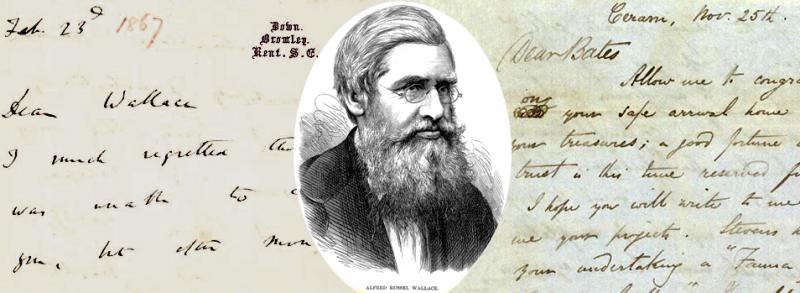Historical research on Wallace (mine included) is frustrated by the difficulty of obtaining scans or transcripts of letters written by or to him. The original copies of these are scattered amongst the libraries of perhaps 100 institutions in several countries and only a very small proportion of them have ever been published. Most of the ones which have been published appeared in Marchant's 1916 book Alfred Russel Wallace letters and Reminiscences, but unfortunately Marchant's transcripts contain many errors and even important omissions of text. Wallace's letters contain much information which is absent from his published works:- ranging from details of interest to biographers attempting to document his life, to information useful to biologists studying the vast number of important natural history specimens he collected during his travels around the Malay Archipelago.
Several months ago I decided to remedy this unsatisfactory situation by trying to set up a project at the Natural History Museum (NHM), London, where I work, which would at last make all of Wallace's letters available to everyone who is interested in reading them. This Wallace Correspondence Project (WCP) would make high quality electronic scans and accurate annotated transcriptions of all surviving correspondence to and from Wallace freely available on the Internet via a user friendly portal. The letters would be transcribed and annotated by trained historians working to the highest scholarly standards, in a very similar way to the Darwin Correspondence Project (http://www.darwinproject.ac.uk/). I am pleased to say that my suggestion for the project met with great enthusiasm at the Museum and myself and several colleagues have carefully worked out the mechanics of the project and made detailed costings of the equipment and personnel needed. We then wrote a pre-proposal (shown below) which we submitted to a large American Foundation to see if they might be interested in funding it. Unfortunately the Foundation in question contacted us last week to say that whilst they found the project interesting, they felt that it did not fit in with their mission sufficiently well, so we are now considering other possible funding sources. If you have any suggestions then please contact me (Dr George Beccaloni) by CLICKING HERE! Also if you happen to have information about the location of letters to or from Wallace, then I would be extremely interested to hear from you.
The Wallace Correspondence Project: An Outline
 |
A. R. Wallace OM, LLD, DCL, FRS, FLS (1823 - 1913) was one of the 19th century's most remarkable intellects. His link to Charles Darwin as the co-discoverer in 1858 of evolution by natural selection would alone have secured his place in history, but he went on to make very many other significant contributions, not just to biology, but to subjects as far-ranging as glaciology, land reform, anthropology, ethnography, epidemiology, and even astrobiology. His pioneering work on evolutionary biogeography led to him becoming recognised as that subject’s ‘father’. Beyond this, Wallace is regarded as the pre-eminent collector and field biologist of tropical regions in the 19th century, and his book The Malay Archipelago is one of the most celebrated travel writings of that century and has never been out of print. Add to the above that Wallace was deeply committed to and a vocal supporter of spiritualism, socialism, and the rights of the ordinary person, and it quickly becomes apparent that he was a man with an extraordinary breadth of interests who was actively engaged with many of the big questions and important issues of his day.
By the time of his death Wallace was probably the world’s most famous scientist, but his intellectual legacy has since been overshadowed by Darwin’s, largely due to the “Darwin Industry” (http://tinyurl.com/7axnt3) of recent decades. This ‘industry’ has led to the prevailing “Darwinocentric” view of the history of modern biology. Consequently, many of the important contributions by Darwin’s contemporaries, like Wallace, are currently underestimated and undervalued.
Thanks partly to the efforts of Charles Smith, who has catalogued Wallace’s published writings (more than 800 articles and 22 books) and made electronic versions of many of them available on the Internet (see http://tinyurl.com/2nxr8), interest in Wallace has been increasing in recent years. This is demonstrated by the fact that since 2000 nine biographies of him have appeared, more than doubling the number published since his death. In the past few months a dramatic resurgence of interest in Wallace has taken place thanks to his link to Darwin and the heightened interest in Darwin due to the approaching anniversary celebrations of 2009. As a direct result, a three day conference on Wallace and Wallacea was held in Indonesia by the Indonesian Academy of Sciences (http://www.indonesianacademy.org), a major book on Wallace’s scholarly work was published by Oxford University Press (http://tinyurl.com/86x79a), an important Web resource was launched (http://wallacefund.info), and a number of articles have appeared in high profile popular and scientific periodicals (e.g. Nature (http://tinyurl.com/8875ft), National Geographic Magazine (http://tinyurl.com/5u4gaa), The Wall Street Journal (http://tinyurl.com/73ooew)).
Several other high profile projects are being planned for 2009, including a Wallace museum on Ternate, Indonesia (from which island Wallace sent his essay on natural selection to Darwin in 1858) and a multi-author book examining Wallace’s spiritualist beliefs. The resource which is currently sorely lacking and which would inform and benefit all of these endeavours is an Web-based archive of Wallace’s personal correspondence, which is the rational behind the proposed Wallace Correspondence Project (WCP).
It is estimated that 4,000 – 5,000 letters to and from Wallace exist in the libraries of approximately one hundred institutions worldwide. Collating and transcribing this material and making it freely available through one user-friendly portal on the Internet would mark a huge advance in Wallace studies. For the first time those interested in the life and work of this great man would have access to a resource equivalent to that of the Darwin Correspondence Project (http://www.darwinproject.ac.uk/). Such an archive would generate a surge of scholarly work on all aspects of Wallace’s life and work, in the same way that the Darwin Correspondence Project has with Darwin. The archive would also be an important resource for students of the history of science, culture and 19th century society, and for scholars interested in that generation of scientists who were at the centre of the debate on evolution. For many of those scientists the theory of natural selection raised major contradictions in their own systems of belief. Access to the correspondence between these men would advance the understanding of the broader debate that existed while revealing some of the personal conflicts that individuals experienced.
The WCP would be based at the Natural History Museum (NHM), London and will involve collaboration between institutions across the globe that hold collections of letters. High definition digital scans of all correspondence will be produced and collated by the NHM who will host the WCP Internet portal. This website will include scanned images of the letters together with full transcripts of them. It will be searchable by keywords similar to the model that is currently online and also hosted by the NHM: http://tinyurl.com/uhtbt This Mellon Foundation funded pilot project comprises only 150 letters and other items from the NHM’s incomparable collection of Wallace manuscript material. The WCP Internet portal would be an active site with regular updates and links to other appropriate sites of interest.
The resources required for the project include the following posts:
• Principal Investigator (Dr George Beccaloni): 20% time over five years and 100% time in year six producing a printed catalogue of correspondence and a book of selected letters.
• Project Manager (Ms Judith Magee, NHM Library): 10% of time over five years. Will be responsible for the day-to-day management of project staff, management of the budget etc.
• Technical Advisor: 5% of time over 5 years. Will provide technical advice on scanning and image editing.
• Paper Conservator: 2% of time over 5 years. Will repair and conserve letters.
• Web Designer: 15% of time over 5 years. Will design database to manage information about letters and design and implement project website.
• Digitisation Technician: 20% of time over 5 years. Will scan the letters.
• Project Administrator: 5 years full time. Will trace copyright holders of letters, undertake secretarial work, order equipment etc.
• Transcriber: 5 years full time. Will transcribe letters and enter them into database system.
• Researcher: 5 years full time. Will trace letters, catalogue them, correct transcriptions and write abstracts and footnotes for the transcripts.
We have calculated the total cost of the project to be $1,646,444 US (currently £1,154,221 GBP).
The anticipated products of the WCP are: 1) a definitive database of scans and annotated transcriptions of all surviving letters to and from Wallace, which is accessible free of charge via an easy to use Internet portal; 2) a detailed printed catalogue of all the correspondence with a brief summary of the contents of each item; 3) a ‘popular’ book of selected correspondence.
The project start date will be winter 2009 or early 2010 funding permitting. The aim is to have the Internet portal fully completed and populated with the majority of the scans and transcriptions by November 7 2013 – the 100th anniversary of ARW’s death.

Add new comment